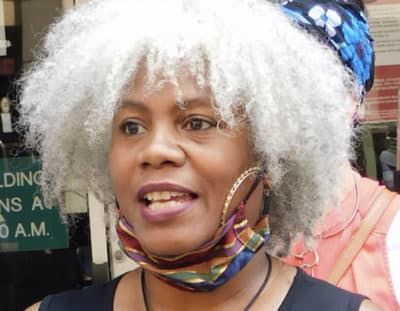Advertisement
Former Police Officer Recounts Firing After She Stopped Fellow Cop's Chokehold

Many cities are now instituting duty to intervene mandates, a directive that says police officers must try to stop excessive force on the part of their colleagues.
This policy push comes after three Minneapolis officers did not stop a fourth officer from fatally kneeling on George Floyd’s neck.
At the time of Floyd’s death, which was captured on video, Minneapolis had a duty to intervene mandate. But oftentimes, as former police officer Arthur Rizer explained to Here & Now, mandates don't work because of police culture — a blue wall of silence that surrounds and protects officers after an act of excessive force.
Baltimore Police Commissioner Michael Harrison told Here & Now that officers have to physically be taught to role play reaching out and restraining fellow cops.
Yet former Buffalo police officer Cariol Horne did just that in 2008 — physically intervened to stop a white officer’s chokehold on a Black subject in handcuffs — and was fired.

“I saw Gregory Kwiatkowski punching Neal Mack in the face,” she says. “Gregory Kwiatkowski was the officer. Neal Mack was handcuffed in the front, which is not protocol. Gregory Kwiatkowski was punching him in the face.”
Once Mack was brought out of the house and into the yard, Horne says Kwiatkowski started choking him.
“When he didn't stop, that's when I grabbed his arm from around Neal Mack's neck,” she says. “That's when he came up out of the crouched position and punched me in the face.”
When Horne, a 19-year veteran of the Buffalo Police Department, reported the incident to her lieutenant, she says the lieutenant said the situation had to be investigated, despite proof that Horne was injured. She says she had to have major dental work done, which included replacing a bridge in her mouth and mending a rotator cuff tear.
But unlike Floyd’s case, there was no video footage of what transpired. Kwiatkowski and other officers who were on the scene claim Horne had actually endangered the arresting officer while he was struggling.
Advertisement
The police department brought disciplinary charges against Horne then fired her months before she would have collected a pension. Horne has been fighting for more than a decade to get her pension.
In 2009, Kwiatkowski was sentenced to four months in prison for excessive force in a separate incident. He and two other officers pulled over four teenagers. Kwiatkowski reportedly rammed the teens, one by one, headfirst into a police car as they were handcuffed.
Mack, who was the suspect during the arrest where Horne intervened, says Horne saved his life by intervening.
"Neal Mack looked like he was about to die," Horne told CBS News. "So had I not stepped in, he possibly could have.”
She came up with the idea for Cariol’s Law, which would require a duty to intervene law in the city while also protecting officers who do so, she says.
“If someone is being beaten by an officer, the only people that can stop it is another officer,” she says.
Buffalo does have a duty to intervene mandate, but it isn’t enough, she says. A specific law would hold officers and police unions accountable, she explains.
“The police unions are part of the problem. If the police unions are telling police officers to break the law, then they are just as guilty and they can even be prosecuted under Cariol’s Law,” she says.
A recent controversy involving the Buffalo Police Department garnered national attention. The police department released a statement claiming an elderly man tripped and fell during a protest against anti-Black racism and police brutality.
Then the video came out — and viewers could see the peaceful protester, a 75-year-old man, was pushed by police. Two Buffalo police officers were suspended without pay after the video spread like wildfire online.
“Everyone got to see how the department really is,” she says. “And that is why Cariol's Law needs to be a law.”
Marcelle Hutchins produced and edited this interview for broadcast with Tinku Ray. Serena McMahon adapted it for the web.
This segment aired on July 21, 2020.

